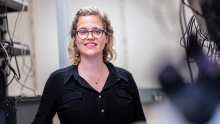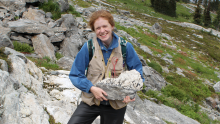Ian McTaggart-Cowan, a nationally recognized zoologist considered one of Canada’s fathers of conservation, passed away April 18. He was just shy of his 100th birthday.
Born in Scotland, McTaggart-Cowan immigrated with his parents to Canada at the age of three and settled in North Vancouver. He graduated from the University of British Columbia in 1932 and earned a PhD from the University of California in 1935. A career biologist, he gained a reputation for his work in the systematics, biology and conservation of mammals, birds and molluscs.
Before joining the faculty at UBC in 1940, he was a staff biologist at the Provincial Museum (now the Royal B.C. Museum) in Victoria, where he helped to expand the museum’s collections, renew avian studies and resurrect field work.
A professor of zoology at UBC, McTaggart-Cowan became department head in 1953. Later, he served as dean of graduate studies until his retirement in 1975. During his 35 years at UBC he established and taught courses in vertebrate zoology, undertook research in birds and mammals, and guided the research of some 100 graduate students.
McTaggart-Cowan travelled widely during his career and published an impressive body of work that included more than 26 publications, 110 television programs and 12 teaching films. He hosted popular science programs for television, most notably “Fur and Feathers,” and helped to pioneer science on television.
At the forefront of many conservation and environmental initiatives, McTaggart-Cowan devoted a lifetime to studying, teaching and protecting the natural resources of British Columbia. His involvement extended far beyond the UBC campus. He played a large part in convincing Canadian governments to recruit trained wildlife biologists for management agencies and consulted on national parks in Canada and abroad.
McTaggart-Cowan was a founding Board member of The Nature Trust of British Columbia, appointed by the Prime Minister in 1971, and was later given the title “Director Emeritus”. He served on the National Research Council of Canada for seven years where he was the first Chairman of the Advisory Committee on Wildlife Research. He also served as the Chairman of the Environmental Council of Canada, the Habitat Conservation Trust Fund of the Province of BC, and the Board of Governors of the Arctic Institute of North America.
“Ian was a great communicator with an encyclopedic knowledge and a contagious and passionate fascination with the natural world. He was also one of the last of the ‘Renaissance men’ in the field of biology,” said Rod Silver, a long time friend, former student and current Director of The Nature Trust. “He did everything and made a major mark in the fields of research, field biology, education, administration and communication.”
McTaggart-Cowan received numerous awards of distinction including the Officer of the Order of Canada and Officer of the Order of British Columbia. He was also Honorary President of BC Nature.
The Cowan Vertebrate Museum—moving to its new home in the Beaty Biodiversity Museum this year—houses over 40,000 specimens of mammals, birds, amphibians and reptiles.
Musqueam First Nation land acknowledegement
We honour xwməθkwəy̓ əm (Musqueam) on whose ancestral, unceded territory UBC Vancouver is situated. UBC Science is committed to building meaningful relationships with Indigenous peoples so we can advance Reconciliation and ensure traditional ways of knowing enrich our teaching and research.
Learn more: Musqueam First Nation
Faculty of Science
Office of the Dean, Earth Sciences Building2178–2207 Main Mall
Vancouver, BC Canada
V6T 1Z4


